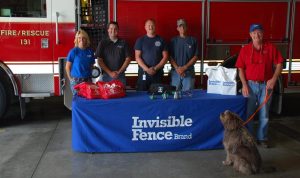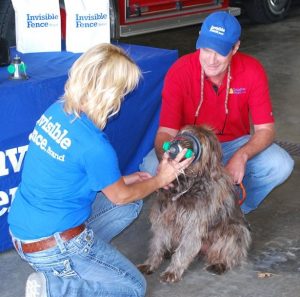(Red Oak, IA – (June 28, 2016) First Responders in Montgomery County are now some of the best-equipped in the nation to save a pet’s life. That’s because Invisible Fence of the Heartland has donated six pet oxygen mask kits to Montgomery County Emergency Management. The donation is just a small part of Invisible Fence® Brand’s Project Breathe™ program, which was established with the goal of equipping every fire station in America and Canada with pet oxygen masks.

Shelly Jenkins with Invisible Fence® Brand of the Heartland presents the pet oxygen masks to Montgomery County Emergency Management Director Brian Hamman, Red Oak Fire Chief John Bruce and Grant Fire Chief Greg Vetter. (Photo’s courtesy Brian Hamman/Montgomery County EMA)
The masks allow firefighters and EMS staff to give oxygen to pets who are suffering from smoke inhalation when they are rescued from fires and often save pets’ lives.
Invisible Fence® Brand has donated a total of more than 12,400 pet oxygen masks to fire stations all over the U.S. and Canada throughout the life of the program. A reported 150+ pets have been saved by the donated masks so far, including two kittens saved by the Salt Lake City Fire Department in March.
Ed Hoyt, Director of Invisible Fence® Brand, said “When a family suffers the tragedy of a fire, lives are turned upside down. Pets are valued family members, so we want families to know that their pet can be cared for if tragedy strikes. We realize that humans are the first priority, but in many cases, pets can be saved if firefighters have the right equipment. The ‘Project Breathe’™ program is simply a way of giving firefighters the tools necessary to save pets’ lives.”

Shelly Jenkins gives a presentation on how to use the pet oxygen mask on her dog to area first responders.
The Red Oak area is now joining the ranks of cities like Seattle, Chicago, Denver, and Salt Lake City who have all received donated pet oxygen masks from Project Breathe™ program. Although the number of pets that die in fires is not an official statistic kept by the U.S. Fire Administration, industry web sites and sources have cited an estimated 40,000 to 150,000 pets die in fires each year, most succumbing to smoke inhalation.
In most states, emergency responders are unequipped to deal with the crisis. The loss is terrible for the family, heart wrenching for firefighters. The company has set up a website, www.invisiblefence.com/O2, where local fire personnel can make a request for their own departments.








